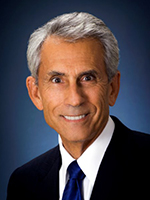Judge John Antoon II
2016 American Inns of Court Professionalism Award for the Eleventh Circuit

Since becoming a judge in 1985, John Antoon has never forgotten the pressure experienced by trial lawyers and the importance of an efficient judicial staff.
After serving as a lawyer in Florida for 14 years, Antoon was elected circuit judge in Florida’s 18th Judicial Circuit. He inherited a felony docket that had been neglected and needed immediate attention.
“The lawyers and members of my staff worked long hours for many months,” he says. “I thought we were doing good work, and I was proud of our effort.”
His colleagues twice elected him chief judge of the circuit, and the state trial judges elected him chair elect of the Florida Conference of Circuit Judges. He was known for showing respect to the trial lawyers who appeared before him and for his compassion and fairness.
Antoon was appointed to the Fifth District Court of Appeal in 1995 and served as chief judge of that court from 1999 to 2000. During that time he was elected as president of the Florida Appellate Judges Conference. In 2000, Antoon was appointed to the U.S. District Court, Middle District of Florida, where he now sits as a senior judge.
As a child of the ’60s, Antoon was inspired to become a lawyer because of the history happening all around him. “The Civil Rights Movement was in full swing; there was so much going on, and I saw the courts as having a central role in ending racial segregation and ensuring opportunity for women,” he says.
After earning his J.D. from Florida State University, Antoon served in the U.S. Army before beginning the practice of law in a small firm in Brevard County, where he grew up. He remembers the examples set by the partners.
“There weren’t mandatory pro bono programs back then, but my partners—most of whom were World War II and Korean War veterans—did such a wonderful job of taking care of people who needed help. Sometimes they drastically reduced their fees, and sometimes they didn’t charge at all,” he says. “I learned so much working with those guys, not just the technical aspects of practice but also the importance of professionalism. And, they understood the importance of lawyers in society; they were very civic-minded.”
Community issues Antoon became involved with were child abuse and domestic violence prevention. He was invited as one of two men to sit on the board of a new organization in the 1980s called The Haven for Children, founded by members of the Junior League. Antoon also served on the Governor’s Task Force on Domestic Violence from 1992 to 1995.
Antoon has been a vigorous supporter of the American Inns of Court. He is a founding member and former president of the Vassar B. Carlton Inn and a member and former president of the George C. Young Inn. He was also a member of the Volie A. Williams Inn and received an appreciation award in 2002 for inspiring the creation of the Dunn-Blount Inn.
“I believe in the American Inns of Court because I believe civility and ethics are essential to the survival of our institution of justice,” he says. “Without it, the integrity of our work would suffer.”
He also believes the Inns provide a wonderful opportunity to mentor young lawyers, something he has also undertaken by teaching law students. He continues to teach at the Barry University Dwayne O. Andreas School of Law in Orlando and has lectured at several other law schools. He has also been a faculty member at several colleges and universities, as well as the College of Advanced Judicial Studies and the Florida Judges’ College.
He appreciates law students’ enthusiasm: “I think they all have such great hopes at making a difference in a positive way. I’m inspired by their energy and their direction.”
What has made his career as a judge so satisfying? Antoon says it’s the people he has worked with and everyone working together with the common goal to make legally correct decisions based on fact and law, not personality or politics.
“I never forget my remarkable good fortune,” he says. “I was a small-town lawyer and was lucky enough to have great partners. And, I worked with talented and committed judges on the state and federal courts. Looking back, I realize how my professional relationships have enriched my life, and I’m so grateful for that.”
Melanie Padgett Powers is a freelance writer and editor in the Washington, D.C. area. She can be reached at MelEdits.com.
© 2016 American Inns of Court. This article was originally published in the November/December 2016 issue of The Bencher, a bi-monthly publication of the American Inns of Court. This article, in full or in part, may not be copied, reprinted, distributed, or stored electronically in any form without the express written consent of the American Inns of Court.